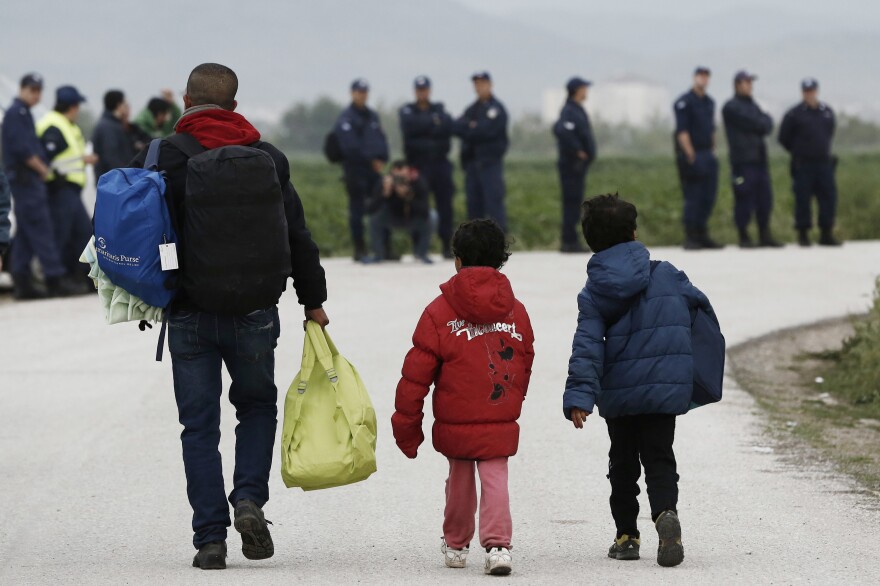Greek authorities have started to move migrants and refugees out of the makeshift Idomeni camp, near the border with Macedonia.
The camp houses approximately 10,000 people, many of whom have been there for months. The asylum-seekers were hoping to cross into Macedonia and continue across Europe, but they were blocked from moving forward after the Balkan state closed its borders.
The Greek government, which has long been trying to persuade migrants to willingly leave Idomeni, has pledged to evacuate the camp without using violence, The Associated Press reports.
"Greek police began clearing out the camp early this morning," Joanna Kakissis reports for NPR. "Migrants will be bused to official camps run by the Greek army."
Reuters reports that the evacuation will last several days and will move refugees and migrants to camps farther south that are designed to hold thousands of people.

Idomeni is an informal camp, with individuals pitching tents and some humanitarian groups providing assistance. The Greek government brought in cleaning crews and portable toilets, the AP reports.
Conditions in the crowded camp were often grim, with frigid nights in the winter, flimsy tents doused by rain, and the ground churned up into mud.
Reporting from the camp earlier this month, Joanna described outbreaks of lice, skin rashes and respiratory infections. Occasional bouts of violence have erupted at the camp, as well.

"The camp has become a symbol of the European Union's mishandling of the migrant crisis," Joanna says.
She notes that a million asylum-seekers entered the EU last year, mainly through the sea passage from Turkey to Greece. And when much of Europe closed its borders this spring, some 54,000 migrants and refugees were trapped in Greece.
At Idomeni three weeks ago, Joanna spoke with one family who gave up on the dream of Germany.
Hassan Bekali, 36, was cleaning up vomit as he spoke to Joanna — his 4-year-old daughter, Fatma, got food poisoning from a sandwich handed out at the camp.
" 'I look and see no choice but humiliation,' he says, as Fatma slumps into his lap. 'I can't feed my children. I can't send them to school. I can't find a place to wash them properly so they're not dirty. I keep asking myself, how is this going to end?'
"Bekali says he used to run a ceramics factory in the Syrian port city of Latakia. He says his business went under during the war and that he was repeatedly arrested and jailed by the regime. 'I don't even know why I was jailed,' he says. 'I still have no idea.'
"Now Bekali's home is this tiny tent. At least his family is all together. He and his wife, Maha, sleep on blankets with Fatma and her two brothers, 6-year-old Ahmad and 1-year-old Hamza.
"Like many Syrians, Bekali was hoping to go to Germany. 'We did not risk our lives and pay so much money to live in misery in a camp,' he says."
Bekali and his family decided they had waited long enough for the Macedonian border to open, and willingly moved to an army-run camp near Athens. There they'll wait to hear about the possibility of eventual resettlement anywhere in the EU. (You can read and hear Joanna's full report here.)

Now thousands of other asylum-seekers at Idomeni will be making the same journey.
Buses carrying more than a thousand people departed from the camp on Tuesday, and heavy machinery cleared up the tents that were left behind.
There were no reports of violence.

The AP spoke to 22-year-old Abdo Rajab about the upcoming evacuation. Rajab, who has been at Idomeni for three months, "is considering paying smugglers to be sneaked into Germany," the wire service writes.
"We hear that tomorrow we will all go to camps," he told the AP. "I don't mind, but my aim is not reach the camps, but to go Germany."
Copyright 2020 NPR. To see more, visit https://www.npr.org.




